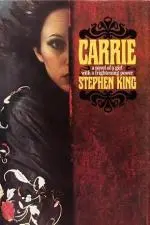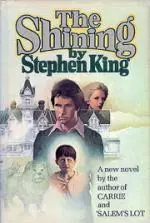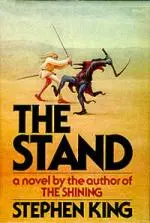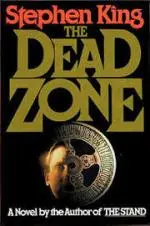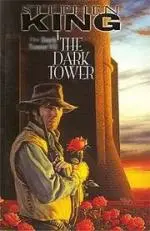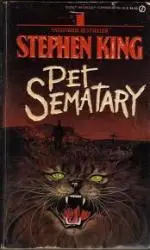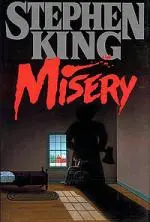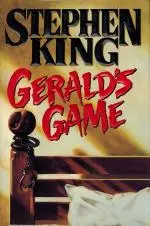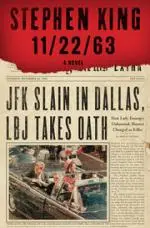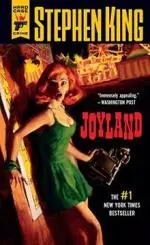Original Author photo by Shane Leonard via stephenking.com
Today is Stephen King’s birthday, and for his birthday, I’d like to grant him a gift that I believe most readers and critics deny him: the acknowledgement that the man can write a really great ending. The horror author is often criticized for his endings, and while it’s true that some of his best books go off the rails in the last fifty or so pages, he’s also put together some of the most imaginative and poetic endings in fiction.
So in honor of The Bard from Bangor’s special day, here are Stephen King’s 10 Best Endings.
![]() "Carrie" (1974)
"Carrie" (1974)
Let's be honest: after the torment and cruelty Carrie White suffers at the hands of her classmates, mother and the rest of the townspeople of Chamberlain, Maine, she deserves some justice. And does she ever get some, in a fiery tumult of telekinetic destruction that reaches a gas station and ultimately leaves Chamberlain a ghost town. Most satisfying is the death of Carrie's hateful mother at Carrie's hands and the car wreck that ends the lives of her chief tormentors, Chris and Billy. The novel wraps up with some clever Congressional hearing transcripts and the tease of another girl like Carrie out there, just waiting for her own day at the prom.
Get Carrie at Bookshop or Amazon
![]() "The Shining" (1977)
"The Shining" (1977)
Another literally explosive ending, and a rare happy one — at least if you're not Jack Torrance. While the man of the house surrenders to the black power of The Overlook Hotel just before the boiler takes out the entire property, his wife Wendy and son Danny escape with The Overlook's former chef Dick Halloran and, in the epilogue, the three form an unusual sort of family at a non-haunted resort in Maine the following summer.
Get The Shining at Bookshop or Amazon
![]() "The Stand" (1978)
"The Stand" (1978)
The Stand actually has two endings, both great: in the originally released and edited version, the story ends with the defeat of Flagg's army, the birth of Frannie's baby and the return of Stu and Tom Cullen to Boulder. Hooray! But in The Complete & Uncut Edition, readers are treated to a more ominous epilogue, in which a resurrected Flagg — who magically teleported from the Vegas explosion to a remote island just in time to survive — takes dark control over the island's inhabitants. The circle closes, and keeps going around and around.
Get The Stand at Bookshop or Amazon
![]() "The Dead Zone" (1979)
"The Dead Zone" (1979)
Sure, our protagonist Johnny Smith is shot to death, and the villain of the story, the terrifyingly Trumpian politician Greg Stillson, lives — but Johnny's made the ultimate sacrifice, forfeiting not only his life but his good name in order to save the world from nuclear disaster. Johnny's willing to go down as an assassin in the hopes of cutting short Stillson's eventual path to the White House, because he's seen the ruinous future that will unfold if Stillson's allowed to become president. While Johnny's assassination attempt is thwarted, Stillson's political future is still dunzo, because that coward is photographed using a small boy as a human shield.
Get The Dead Zone at Bookshop or Amazon
![]() The Dark Tower Series (1982-2012)
The Dark Tower Series (1982-2012)
This may be the most controversial pick on my list, but I don't think The Dark Tower could have ended any other way: with Roland reaching the top of the Tower and starting his flawed, uphill quest all over again, only this time in the hopes of getting it right by showing compassion, love and respect for the ka-tet he meets along the way. After all, this time he picked up The Horn of Eld, like his late friend Cuthbert wished. And, c'mon, doesn't it just feel right that the series should end with the same twelve words that opened it? "The man in black fled across the desert, and the gunslinger followed."
Get The Dark Tower Box Set at Bookshop or Amazon
![]() "Pet Sematary" (1983)
"Pet Sematary" (1983)
Probably the bleakest ending in Stephen King's arsenal, Pet Sematary nevertheless concludes with a poetic unhappiness: Louis Creed has lost his son Gage, resurrected him in spite of his neighbor Jud's best warnings, and then put him back in the ground after Gage murders both Jud and Louis' wife Rachel. But does Louis learn? No, no, he doesn't, and hoping that the quicker turnaround will result in a more effective reanimation, he plays solitaire while waiting for the return of his wife. The book ends with Rachel dropping a corpse-like hand on Louis' shoulder and whispering "Darling" in his ear. We don't see where it's going, but we know it can't be good.
Get Pet Sematary at Bookshop or Amazon
![]() "Misery" (1987)
"Misery" (1987)
After everything author Paul Sheldon has suffered at the hands of his #1 fan Annie Wilkes, it's extremely gratifying to see him shove the burning pages he wrote at her command into her mouth and throttle her with the typewriter she forced him to use. Paul escapes and Annie dies, but he suffers PTSD, alcoholism and writer's block after his ordeal. Still, in the final pages, King takes pity on the writer who must be in part inspired by himself, and Misery ends with Paul weeping with relief as he starts a new book after a flash of inspiration.
Get Misery at Bookshop or Amazon
![]() "Gerald's Game" (1992)
"Gerald's Game" (1992)
Gerald's Game is the rare Stephen King story in which the twist is that the events aren't supernatural. After the immense relief of witnessing Jessie Burlingame escape from the handcuffs her emotionally abusive husband left her in before dying of a heart attack — all the while processing the sexual trauma she suffered from her father in her youth — we then learn in the months-later epilogue that the "Space Cowboy" apparition that was haunting Jessie was actually a necrophiliac murderer who found his way to the secluded cabin where Jessie was imprisoned. It's a surprising end, but also an elegant one, and Jessie remains one of the best women Stephen King has ever written.
Get Gerald's Game at Bookshop or Amazon
![]() "11/22/63" (2011)
"11/22/63" (2011)
In the afterword of 11/22/63, King writes that his son — the terrific author Joe Hill — advised him in this particular ending, and it's got to be the loveliest conclusion King ever wrote. The time-traveling Jake Epping saves JFK from assassination and then realizes that his meddling resulted in catastrophic effects in the timeline. He sacrifices his romance with the love of his life Sadie to undo these changes, but then he finds her again in the present day — where she's in her 80s, and Jake is still in his 30s — and he asks her to dance. To quote The Ghost of Christmas Past in Scrooged: "Niagara Falls."
Get 11/22/63 at Bookshop or Amazon
![]() "Joyland" (2013)
"Joyland" (2013)
Joyland may be the most underrated King novel, a perfect little Bildungsroman that takes place at a North Carolina amusement park in the summer and fall of 1973. It's a murder mystery with a fun little Scooby-Doo ending, but more importantly it's the story of Devin Jones, who heals from a heartbreak, saves a few lives and grows into the best kind of man.
Get Joyland at Bookshop or Amazon
So what'd I miss? Do you have a favorite Stephen King ending that's not on the list? Speak up below!

About the author
Meredith is a writer, editor and brewpub owner living in Houston, Texas. Her four most commonly used words are, "The book was better."
